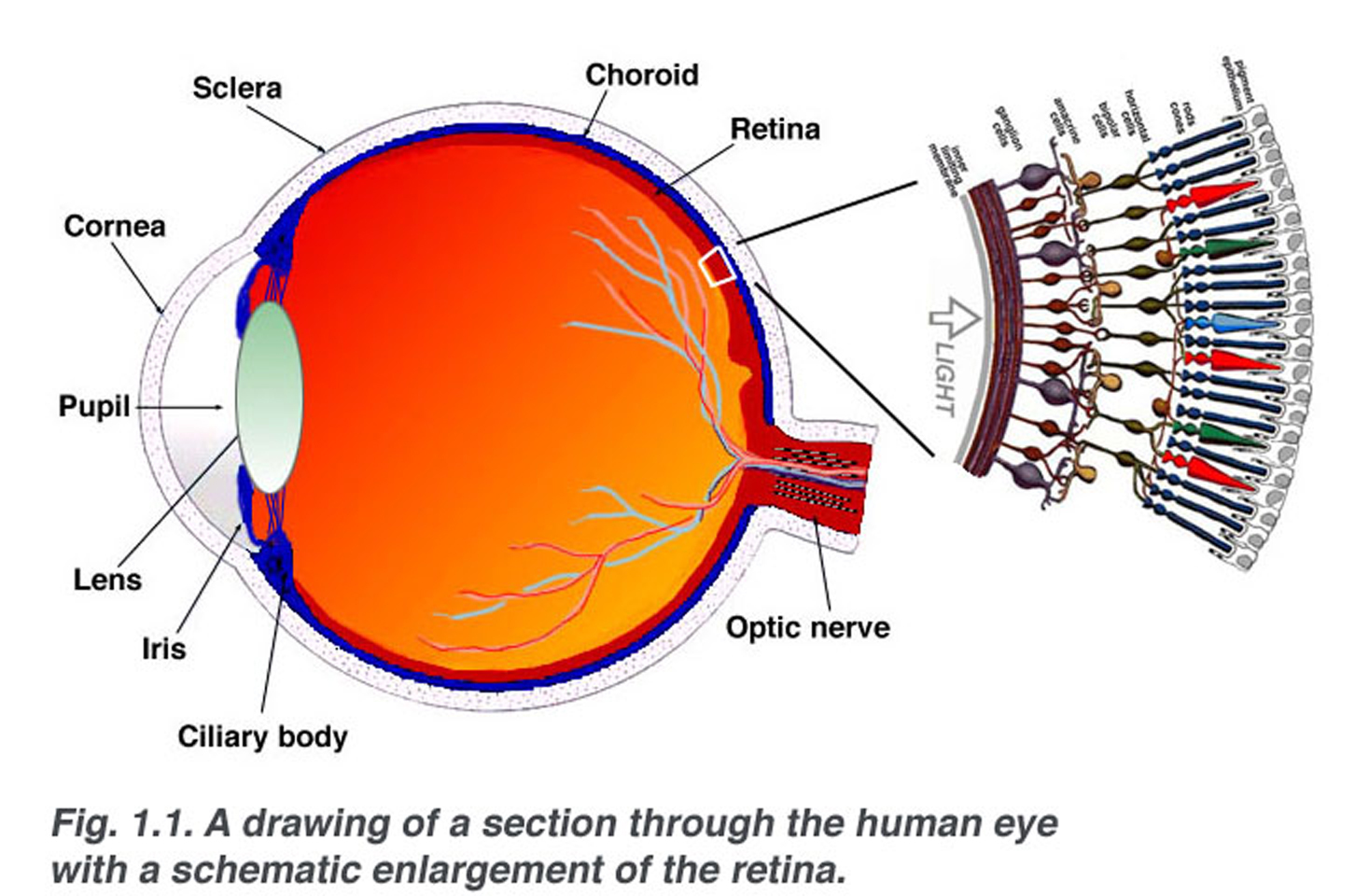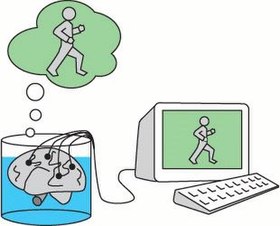Asexperia
Registered Senior Member
Is there a difference?
Abstraction is a mental process, but if we do it based on reality it's objective. Time measurements are objective abstractions too.
Is there a difference?
Not really. Our brains are not capable of objective observation. All that our brains can do is make "best guesses" as compared to the information stored in our memory.Abstraction is a mental process, but if we do it based on reality it's objective. Time measurements are objective abstractions too.
Not really. Our brains are not capable of objective observation. All that our brains can do is make "best guesses" as compared to the information stored in our memory.
A stop-watch is relatively objective, but only in recording the mathematics of past durations (mathematical memories)
I was addressing the brain function. The brain is unable to distuingish objective truth. It has no direct observation of anything outside of the sensory receptors and it receives its information not from direct obseravtion but from electro/chemical bits from which it must construct a composite pattern.Objective is not only what is outside the mind, but everything that is based on the truth. For example: 3x2=6. This operation is composed for conventional symbols, but the relation is objective.


I was addressing the brain function. The brain is unable to distuingish objective truth. It has no direct observation of anything outside of the sensory receptors and it receives its information not from direct obseravtion but from electro/chemical bits from which it must construct a composite pattern.
As this is not pertinent to the OP I have copied your post and my response to "Biology and Genetics" (Eye Brain), where we can continue this subject if there is interest.
Of course an artificial "observer" like a camera is an objective observer. The image passes through the lens directly on the photographic plate, which in humans is the back of the eye and consists of arrays of ganglian cells each sensitive to seperate wave lengths. After seperating the image all this encoded information is fed into brain via the optic nerve, which now has to reassemble these millions of bits and then compare it to its memory of what it is actually assembling.

https://webvision.med.utah.edu/wp-content/uploads/2018/05/sagschem.jpg

https://www.researchgate.net/figure...hiasmal-afferent-visual-system_fig1_267738457
While it can distinguish between relative values and can mathematically process these values, the brain never does exactly "know" what it is processing. This gives an advantage in some ways because it is not a rigidly fixed process but sensitive to new information which allows it to modify its "recognition from memory" into a new paradigm.
p.s. note the presence of MT processors in the Myelinated Axons of the Optic Nerve.....
Anil Seth nailed it down with "the brain makes a best guess" of the electro-chemical information it is processing.The Brain does know that the information its processing , is based on the the physical . ( the Brain is physical ) .
Anil Seth nailed it down with "the brain makes a best guess" of the electro-chemical information it is processing.
It has no direct sensory experience at all, but like a digital computer, translates incoming info and compares it to its expectation from memory.
As Seth says "you see what you believe you see and only when everybody agrees on what they believe they see, we call that reality".
Your brain doesn't know what reality is. It can only make a best guess. It has no direct experience of reality.They agree about reality because reality is real . And reality has some fundamentals , air , water , rock , heat , and life . Not because we agree , but because reality is

In philosophy, the brain in a vat (BIV; alternately known as brain in a jar) is a scenario used in a variety of thought experiments intended to draw out certain features of human conceptions of knowledge, reality, truth,
mind, consciousness, and meaning.
Common to many science fiction stories, it outlines a scenario in which a mad scientist, machine, or other entity might remove a person's brain from the body, suspend it in a vat of life-sustaining liquid, and connect its neurons by wires to a supercomputer which would provide it with electrical impulses identical to those the brain normally receives.
https://en.wikipedia.org/wiki/Brain_in_a_vatAccording to such stories, the computer would then be simulating reality (including appropriate responses to the brain's own output) and the "disembodied" brain would continue to have perfectly normal conscious experiences, such as those of a person with an embodied brain, without these being related to objects or events in the real world.
Well, there you go. You know what you are saying , inside your mind. But I haven't got a clue as to what you are expressing with these random words.Psychology .
Disagree ; the Brain is made of reality .
Take injuries and nutrition ( Nourishment ) . Both influence the Health of the Brain .

You give me nothing to allow me to make a best guess as to what you are saying.....
Did you watch the lecture by the expert, or have you decided to ignore the science ?

I was addressing the brain function. The brain is unable to distuingish objective truth. It has no direct observation of anything outside of the sensory receptors and it receives its information not from direct obseravtion but from electro/chemical bits from which it must construct a composite pattern.
As Seth says "you see what you believe you see and only when everybody agrees on what they believe they see, we call that reality".
Disagree , to your last statement .
They agree about reality because reality is real . And reality has some fundamentals , air , water , rock , heat , and life . Not because we agree , but because reality is .
We are partly from the inorganic chemistry of elements and from organic chemistry . Think of what the body needs in which to become . Any living form really .
That is only partly correct, and sensory ability is not restricted to brained organisms and already is present in single celled organisms, like bacteria.Senses are an extension of the brain. Senses capture reality and the brain compares sensations.
In biology, quorum sensing is the ability to detect and to respond to cell population density by gene regulation. As one example, quorum sensing (QS) enables bacteria to restrict the expression of specific genes to the high cell densities at which the resulting phenotypes will be most beneficial. Many species of bacteria use quorum sensing to coordinate gene expression according to the density of their local population. In a similar fashion, some social insects use quorum sensing to determine where to nest. Also, quorum sensing might be useful for cancer cell communications too.
https://en.wikipedia.org/wiki/Quorum_sensingIn addition to its function in biological systems, quorum sensing has several useful applications for computing and robotics. In general, quorum sensing can function as a decision-making process in any decentralized system in which the components have: (a) a means of assessing the number of other components they interact with and (b) a standard response once a threshold number of components is detected.
No, subjective realism.subjective idealism.
You are talking about experiencing apparent length of duration depending on your state of mind. This is a wholly subjective experience based on the brain's expectation.Even the same person may have different ideas about a certain period of time depending on their mood.
What does any of this have to do with the thread topic?That is only partly correct, and sensory ability is not restricted to brained organisms and already is present in single celled organisms, like bacteria.
Unconscious sensory stimulation begins with chemical reactions and has evolved into complex sensory adaptations. Bacteria can "communicate" via "quorum sensing" . This is a scientific term. https://en.wikipedia.org/wiki/Quorum_sensing
